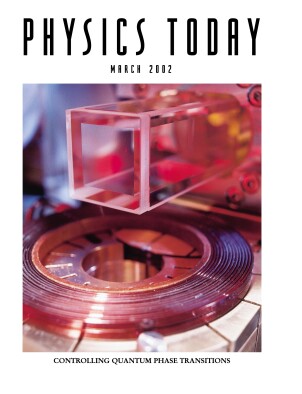Eighteen Scientists Garner IOP Prizes
DOI: 10.1063/1.2408468
The Institute of Physics, located in London, has announced the winners of its 2002 awards, presented at a ceremony in January.
The Glazebrook Medal and Prize went to George Kalmus, an honorary senior scientist at the Rutherford Appleton Laboratory in Didcot, Oxfordshire, UK. He was recognized for his “leadership and promotion of particle physics in the UK and internationally.”
Jane Brown won the Guthrie Medal and Prize for her “outstanding contribution to the field of neutron scattering, especially in the area of polarization phenomena in scattering processes.” She is a senior scientist (retired) at the Institut Laue-Langevin in Grenoble, France.
John Hannay received the Paul Dirac Medal and Prize in recognition of his “outstanding contribution to theoretical physics in the areas of quantum mechanics, classical mechanics, and optics.” He is a professor of theoretical physics at the University of Bristol.
The IOP presented the Max Born Medal and Prize to Siegfried Dietrich, a director of the Max Planck Institute for Metals Research and chair of theoretical physics at the University of Stuttgart. He was honored for his “important contributions to the theory of wetting phenomena.” This prize was made jointly with the German Physical Society.
Robert Lambourne and Michael Harry Tinker were jointly awarded the Bragg Medal and Prize for their “contribution to physics education, particularly through the development of the Flexible Learning Approach to Physics.” Lambourne is the head of the department of physics and astronomy at the Open University, headquartered in Milton Keynes, Buckinghamshire. Tinker is a senior lecturer in physics at the University of Reading in Berkshire.
Peter Woods received the Charles Chree Medal and Prize in honor of his “contributions to environmental metrology, in particular the detection and monitoring of atmospheric trace gases and air pollution.” Woods is a senior fellow and the head of science of the analytical science group at the National Physical Laboratory in Teddington, Middlesex.
Federico Capasso garnered the Duddell Medal and Prize for his “contributions to engineering materials and solid-state devices, in particular the invention and demonstration of the quantum cascade laser.” He is the vice president of physical research at Bell Laboratories, Lucent Technologies, in Murray Hill, New Jersey.
The recipient of the Holweck Medal and Prize is John Pethica, SFI Research Professor at Trinity College Dublin and a visiting professor of materials science at the University of Oxford. He was noted for his “contributions to the field of nanometer and atomic-scale mechanics.” This award was made jointly with the French Physical Society.
The IOP presented the Kelvin Medal and Prize to Peter Kalmus, acknowledging his “contributions to the public understanding of physics through public talks, lectures, and other activities.” He is an emeritus professor of physics at Queen Mary, University of London.
Andrew Schofield, a professor of theoretical physics at Birmingham University, won the Maxwell Medal and Prize. He was cited for his “outstanding contributions to the physics of highly correlated systems, particularly his efforts to develop novel experiments that reveal the underlying physics of emergent phenomena in materials.”
The Mott Medal and Prize went to Maurice Skolnick, a professor of condensed matter physics at Sheffield University. He was honored for his “major contributions to the understanding of excitons, defects, and interaction phenomena in semiconductors.”
Polina Bayvel, winner of the Paterson Medal and Prize, was cited for her “contributions to research in fundamental aspects of nonlinear optics and their applications in optical communications systems.” She is affiliated with University College London as a Royal Society University Research fellow and is a reader in the department of electronic and electrical engineering.
Martin Wood, honorary president of Oxford Instruments, was given the President’s Medal for his “outstanding contributions to physics and its application, in particular for his entrepreneurial role as founder of Oxford Instruments.”
The Rutherford Medal and Prize were shared by Peter Dornan, David Plane, and Wilbur Venus . They were recognized for their “major contributions to the development of the detectors of the Large Electron-Positron Collider and their leadership of the international ALEPH, OPAL, and Delphi experiments.” Dornan is a professor of physics at Imperial College London, Plane is a senior staff member at CERN and the spokesman for the OPAL collaboration, and Venus is an honorary scientist at the Rutherford Appleton Laboratory.
Ravi Silva, a professor of solidstate electronics at the University of Surrey, received the Charles Vernon Boys Medal and Prize for his “outstanding contribution to experimental physics in the development of electronic materials for advanced device applications, particularly in carbonbased electronics.”




